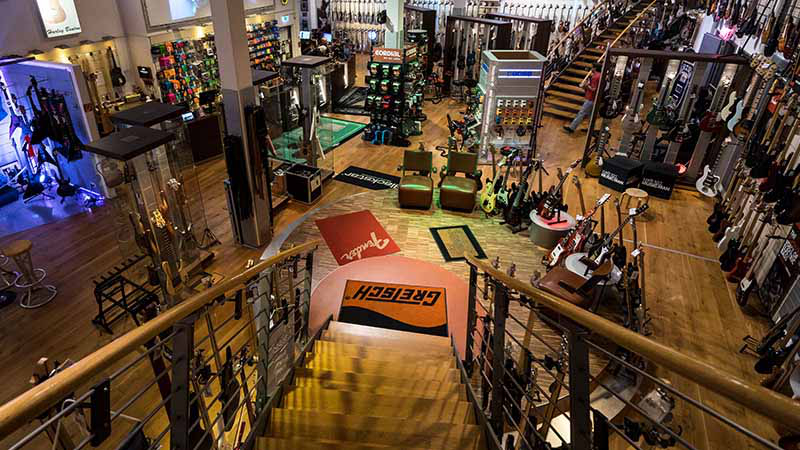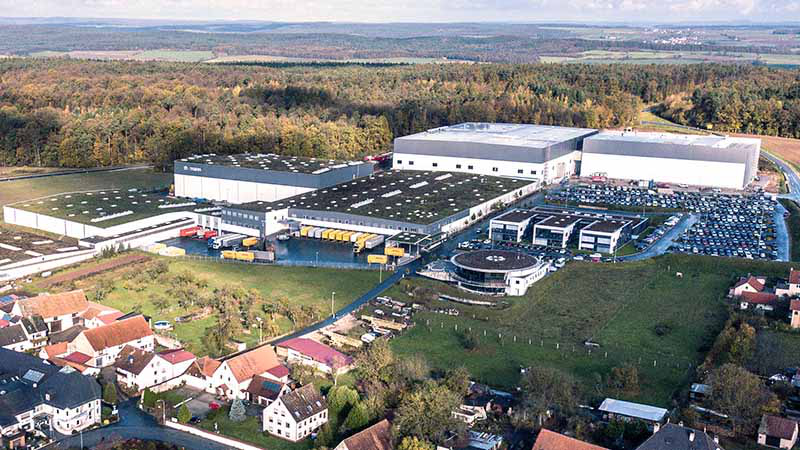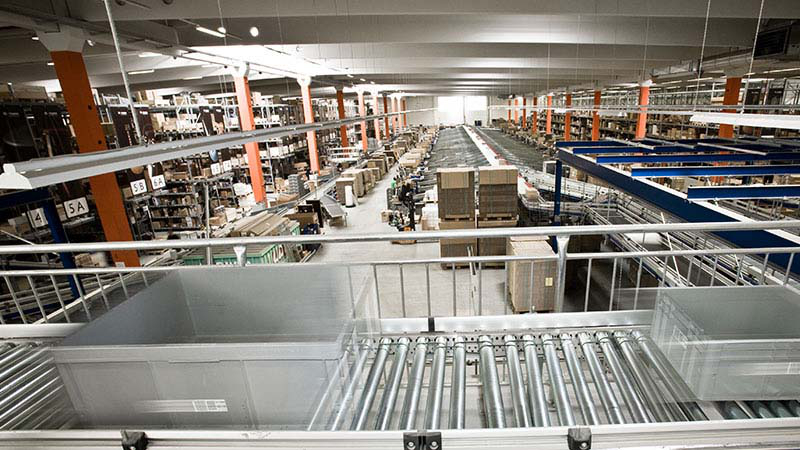- TGW accompanies the retailer's strong growth as long-time intralogistics partner
- Order throughput time reduced to 20 minutes
- Expansion during live operation as a particular challenge
(Marchtrenk, 25 May 2022) Treppendorf is the Mecca of many musicians. Every year, thousands of people visit the small Upper Franconian village of 201 inhabitants. Their destination: Musikhaus Thomann. Around 90,000 items are kept permanently in stock in the logistics centre. When you decide on a particular instrument in the shop, it's ready to go home with you after just half an hour; however, the online shop generates the lion's share of the revenue.
Online customers not only receive their ordered goods quickly, but usually in one package regardless of whether they ordered one item or ten. Though sustainable and cost-saving, this is a challenge when it comes down to logistics due to the need to merge items both large and small, fast- and slow-moving.
Intralogistics partner
TGW Logistics Group is Thomann's longstanding intralogistics partner. TGW started to automate the Versand-Center-Süd (VCS - Shipping Centre South) in Treppendorf as general contractor in 2008. "If the number of orders and the number of items are rising fast and at the same time, or if the requirements change, companies are better off thinking about expansion sooner rather than later to ensure that everything is available at the right time," explains Markus Kammerhofer, Director Sales Retro at TGW. "Thomann's revenues have increased by a double-digit percentage in the last few years, meaning that the system commissioned in 2008 could never have kept up with the current order volume," adds Norbert Groth, Technical Logistics Manager at Thomann. For this reason, in addition to the Versand-Center-Süd, the new Versand-Center-Nord (VCN - Shipping Centre North) has been live since 2017.

In 2009, Thomann had a system that could process 20,000 parcels per day. It consisted of a four-aisle automated mini-load warehouse with 70,000 storage locations and a picking process for fast-moving items; TGW also installed eight "Mustang" storage and retrieval machines. In addition, Thomann was equipped with an automatic pallet warehouse comprising five aisles and 18,000 storage locations, which went live in 2010 after two expansion stages. The core of the installation was a Natrix sorter, and employees packed up the items at 32 packing stations.
Successful expansion concept
Hans Thomann was very proud of the system performance resulting from the twelve million Euro investment: the output had increased by 40 to 50 percent compared to the previous system. The throughput time had been reduced to 28 minutes. TGW's expansion concept had been successful. The picking process for the different commodity groups comprising various sizes (from instrument cables to electronic pianos) had been optimised. The system was controlled by TGW software. Around four million customers could choose from 65,000 items. However, both the number of customers and the number of items increased further. Therefore, Hans Thomann decided to build the Versand-Center-Nord (VCN), once again turning to TGW as Partner of Choice.

The VCN went live in 2017/18. The order included a high-bay warehouse with 21,000 storage locations for pallets as well as a shuttle system with six aisles and 110,000 storage locations for small parts. Thomann also invested in automatic carton erecting machines and sealing machines, as well as an efficient goods-to-person picking area. TGW also modernised the WMS. Thomann now uses TGW Warehouse Software for the Warehouse Management System (WMS), Warehouse Control System (WCS) and the Material Flow Controller (MFC).
Throughput time reduced to 20 minutes
Thanks to the successful expansions that TGW had implemented in the past, Thomann approved further projects in 2020. An expansion of the high-bay warehouse was planned to improve the replenishment process. Additionally, a new goods-out loop with automatic labelling machines for up to 2,000 parcels per hour went into operation at the beginning of 2022. The increase in e-commerce due to the corona pandemic has led Thomann to think about further expansion projects.
Thanks to the expansions, Thomann has reduced the throughput time from 28 minutes to 20 minutes – despite the increase of available items from 65,000 to 90,000. Instead of four million customers, more than twelve million customers all over Europe are now supplied with goods from Treppendorf.

Expansion during live operation
"The most important rule is: Do not interrupt live operation while expanding and modernising the system," emphasises Norbert Groth. Detailed planning, intensive testing, well-defined functional specifications, clearly defined processes and a perfectly planned schedule are some of the keys to success according to the experts in the Retrofit department at TGW. A so-called Big Bang was not possible in Treppendorf. The e-commerce business makes it unfeasible to shut down the system for several weeks; on top of that, the warehouse normally operates six days a week. For these reasons, all the work had to be performed between Friday evenings and six o'clock on Mondays.



